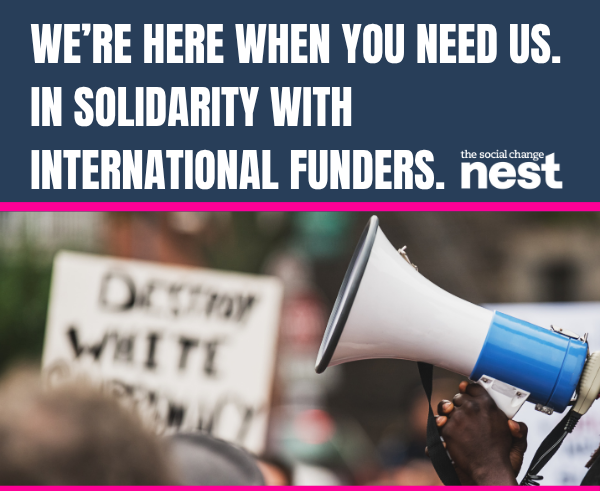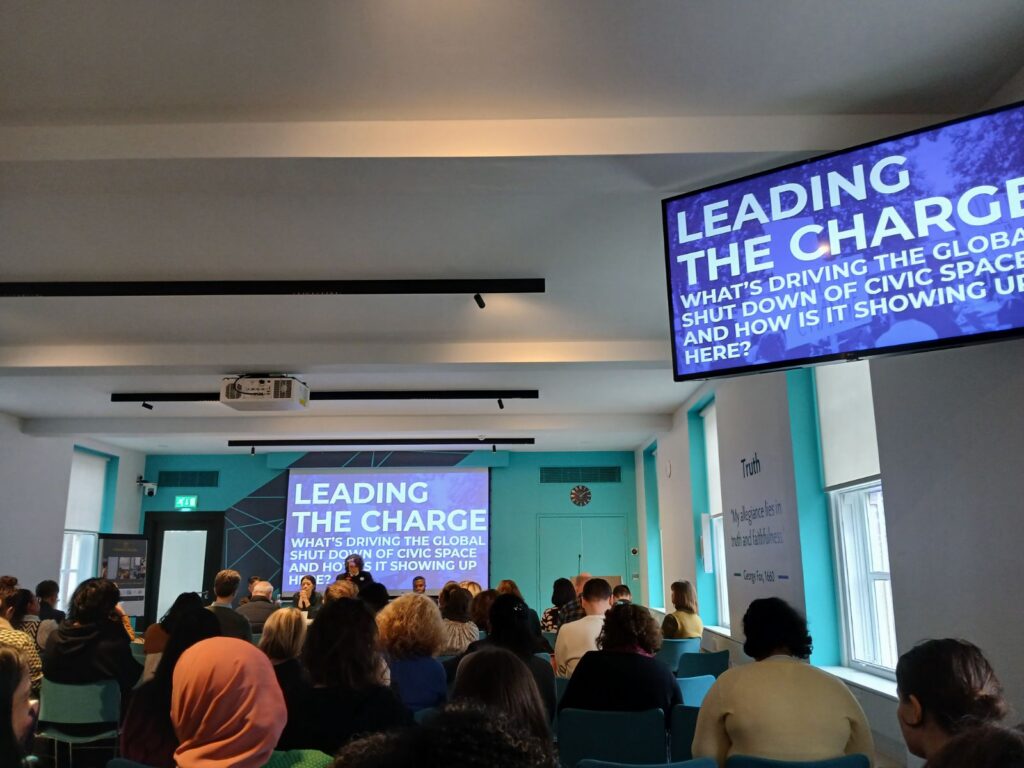Open Society Foundations Investigation - What Funders Need to Know
The Social Change Nest supports funders to get money into the hands of those at the frontlines of social change. If your foundation is navigating these challenges or exploring alternative grantmaking pathways, please get in touch for a chat to find out how we can help.
Jump to section
The Trump Administration has directed investigations into Open Society Foundations
We’re watching what’s happening to civil society in the United States with deep concern. The investigation into the Open Society Foundations isn’t just an American issue. It’s a warning sign for those of us working on social change globally about how quickly the space for independent philanthropy and advocacy can narrow.
From our vantage point here in the UK, we want to be clear: we stand in solidarity with US foundations, nonprofits, and the entire civil society sector navigating this moment. And more practically, we want you to know that alternative pathways exist for continuing your vital work.
Why are Open Society Foundations being investigated?
In late September 2025, the US Department of Justice directed federal prosecutors to prepare investigations into the Open Society Foundations, the philanthropic network founded by George Soros. The directive suggests potential charges including racketeering, fraud, and material support for terrorism. Serious allegations, made without any publicly presented evidence.
This follows President Trump’s signing of National Security Presidential Memorandum-7 (NSPM-7) on September 25, titled “Countering Domestic Terrorism and Organised Political Violence”. The memorandum directs federal agencies to investigate, prosecute, and disrupt nonprofit organisations the administration claims are supporting or funding domestic terrorism.
Legal experts from major firms including Arnold & Porter and Patterson Belknap immediately flagged the memo’s deliberately vague language about “political violence” as designed to capture progressive organisations whose only “crime” is opposing administration policies.
The Open Society Foundations responded clearly: “The Open Society Foundations unequivocally condemn terrorism and do not fund terrorism. Our activities are peaceful and lawful.” They called the allegations “politically motivated attacks on civil society, meant to silence speech the administration disagrees with and undermine the First Amendment right to free speech”.
The response from the US philanthropic sector has been remarkable. Over 100 foundations and nonprofits, including the Ford Foundation, MacArthur Foundation, and Knight Foundation, signed an open letter condemning the threats and defending their right to do this work.
The strategic intent behind the investigation
Whether or not the Open Society Foundations ever faces formal charges is almost secondary to the investigation’s real purpose.
The goal is to create what legal experts call a “chilling effect”. A climate where funders, organisations, and donors second-guess whether supporting certain causes or speaking up on certain issues is worth the risk. Open Society Foundations and the Children’s Investment Fund Foundation are the latest in a series of direct attacks on funders. The cost doesn’t have to be criminal prosecution. The cost can be expensive legal defence, reputational damage, donor anxiety, board panic, and staff burnout.
This is particularly effective against philanthropic infrastructure. George Soros contributed over $170 million during the 2022 midterm cycle. The timing of this investigation, coming before another election cycle, isn’t coincidental. As political analysts have noted, one explicit goal is to “choke off money from bigger donors” and “make it harder for Democrats to raise money”.
But the impact extends far beyond electoral politics. When a major funder like OSF comes under federal investigation, every organisation they support has to consider whether that association becomes a liability. Other funders start wondering if supporting similar causes might put them in the crosshairs. Smaller organisations dependent on that funding start making “strategic” decisions to soften their advocacy or avoid controversial issues.
The apparatus being deployed is comprehensive: the Justice Department, the FBI, Department of Homeland Security, Immigration and Customs Enforcement, and critically, the Internal Revenue Service. For most US nonprofits, 501(c)(3) status is essential for survival. The threat of politically motivated IRS audits or tax-exempt status revocation is, as legal experts describe it, “a fatal blow for most nonprofits”.
Why this matters beyond US borders
We’ve seen versions of this playbook before in other contexts. The use of “national security” language to target civil society. The deliberate blurring of lines between legitimate advocacy and criminal activity. The weaponisation of tax and regulatory systems against organisations doing legal, constitutionally protected work.
Viktor Orbán’s government in Hungary has been using similar tactics against Soros and organisations linked to OSF for years, forcing some to relocate operations. We’re seeing variations of this approach in multiple countries where civil society space is shrinking.
What makes the US situation particularly significant is its scale and the precedent it sets. The Open Society Foundations operates in more than 100 countries. US foundations collectively provide crucial funding for global human rights work, environmental advocacy, and democratic strengthening. When US philanthropy comes under this kind of pressure, the ripple effects are felt worldwide.
For those of us working internationally on social change, this isn’t just about one foundation or one country. It’s about whether independent philanthropy can continue to operate without fear of state retaliation when it funds work that challenges power, pushes for justice, and imagines different futures.
Standing in solidarity
We at The Social Change Nest stand in solidarity with US foundations, nonprofits, and civil society organisations navigating this moment. The targeting of the Open Society Foundations is an attack on the fundamental premise that organisations should be free to fund and advocate for social change without fear of government retaliation.
The response from the US sector has been encouraging. The unified statement from over 100 foundations and nonprofits matters. The ACLU calling this “the latest example of just how far the Trump administration will go to silence its critics” matters. Organisations building “NATO-like” mutual defence pacts represents important strategic thinking.
But we also recognise that statements and solidarity, while necessary, aren’t sufficient. Foundations and organisations need practical options for continuing their work in an increasingly hostile regulatory environment.
Contingency planning and alternative funding pathways
This is where our transatlantic perspective becomes relevant. We work with foundations and funders navigating complex regulatory environments and the practical challenges of getting resources to where they’re needed most.
As funding regulations shift in the US, ensuring the continuity and compliance of impactful grantmaking is cruciaal. If your foundation is considering strategies for future grant cycles, particularly for international, climate, or DEI initiatives, alternative routes for grantmaking exist.
Intermediary structures can provide a layer of separation between funders and controversial work. Not to hide legitimate activities, but to create a buffer against political targeting. This isn’t about doing anything illegal. It’s about using established philanthropic infrastructure to ensure resources reach their intended recipients even when political winds shift.
International partnerships can enable US foundations to continue supporting crucial work through collaboration with organisations based in different jurisdictions. The Social Change Nest works extensively with both US and UK foundations. We understand the regulatory frameworks, reporting requirements, and practical realities of cross-border grantmaking.
Regranting mechanisms through established intermediaries can help foundations maintain their commitment to causes that have become politically sensitive while managing risk in ways that protect both funders and grantees.
We’re happy to have a confidential chat about how we can help you figure out a path forward during these turbulent times. Sometimes having a conversation with someone outside the immediate US context can provide both practical options and strategic perspective.
What UK and international funders should be watching
For those of us working from outside the US, this moment is also instructive for our own contexts.
Don’t assume your regulatory environment is stable. What’s happening in the US today could be attempted elsewhere tomorrow. The tactics being used are portable across jurisdictions: vague “terrorism” or “national security” language to target civil society, weaponisation of tax authorities, conflation of legitimate advocacy with criminal activity.
Think about your exposure to US regulatory reach. If you fund work in the US or partner with US organisations, you need to understand how changes in the US regulatory environment might affect your work. If you receive funding from US sources, you need to understand how pressure on US funders might impact your own funding streams.
Consider how you can provide support and solidarity. UK and European foundations are in a position to offer both political support through public statements and practical support through partnerships that help US organisations continue their work through international channels.
Strengthen the infrastructure for cross-border collaboration now, before you need it in crisis mode. Building relationships, understanding regulatory frameworks, and establishing partnerships takes time. Do it proactively, not reactively.
Practical steps for US foundations right now
If you’re leading a US foundation or managing grantmaking in this environment, here are some concrete considerations:
Review your legal preparedness. Ensure you have legal counsel familiar with First Amendment issues, nonprofit law, and the specific risks created by NSPM-7. Document your grantmaking decisions thoroughly. Understand your rights and obligations.
Assess your portfolio through a risk lens. Not to eliminate risky work, but to understand where you might be most vulnerable to political targeting and to make conscious, strategic decisions about how to structure your support.
Build relationships with peer funders now. The mutual defence networks being created need broad participation. Don’t wait until you’re under scrutiny to figure out who your allies are.
Consider international partnerships. Working with UK or European fiscal hosting intermediaries might provide additional pathways for supporting certain work, particularly international initiatives.
Have honest conversations with your board. Don’t pretend this doesn’t affect you. Talk explicitly about the risks, your values, and your strategy for continuing your mission in a changing environment.
Communicate clearly with grantees. Organisations you fund need to know whether they can count on your continued support or whether they need to prepare for disruption.
Document your due diligence. In a climate where philanthropic decisions might be scrutinised for political reasons, thorough documentation of your grantmaking process provides protection.
Defending civil society infrastructure
The Open Society Foundations investigation is one battle in a longer war over the future of independent civil society. The outcome will shape whether foundations can continue to fund work that challenges power, whether advocacy organisations can operate without fear of state retaliation, and whether the infrastructure for social change remains viable in increasingly polarised political environments.
This isn’t just about Trump or this particular administration. The tools being deployed here don’t disappear with election cycles. The precedent being set will outlast any single presidency.
What gives us hope is the response we’re seeing. The unity across the US philanthropic sector. The willingness of major institutions to speak up. The strategic thinking about mutual defence and collective resilience. The recognition that an attack on one is an attack on all.
But hope isn’t enough. This moment requires practical action, strategic planning, and a willingness to think creatively about how to protect the infrastructure for social change.
How we can help
The Social Change Nest works with foundations and funders navigating exactly these challenges. We understand the landscape for international grantmaking, the regulatory frameworks in multiple jurisdictions, and the practical realities of getting resources to where they’re needed whilst managing risk appropriately.
We’re not suggesting we have all the answers. But we do have experience helping foundations think strategically about their work in complex environments, build partnerships across borders, and find pathways forward when their usual approaches become untenable.
As funding regulations shift, ensuring the continuity and compliance of impactful grantmaking is crucial. If you think we might be able to help you, or you just want to speak to someone to explore options then please do get in touch.
Open Society Foundations FAQ
Q: Is this investigation targeting all progressive foundations or just OSF?
A: Whilst the Open Society Foundations is the named target, the National Security Presidential Memorandum (NSPM-7) uses deliberately vague language that could capture a wide range of progressive organisations. Legal experts have warned that the memo’s definitions of “political violence” and “domestic terrorism” are broad enough to include constitutionally protected activities like funding advocacy groups or organising protests. Other organisations mentioned in administration rhetoric include the Southern Poverty Law Centre, the Ford Foundation, and various grassroots groups. The investigation creates a chilling effect that extends far beyond OSF itself.
Q: Can UK or European foundations be affected by US regulatory actions?
A: Yes, potentially. If you fund work in the US, partner with US organisations, or receive funding from US sources, changes in the US regulatory environment could affect you. Additionally, these tactics are portable. What’s happening in the US could be attempted in other jurisdictions. This is why it’s important to strengthen cross-border relationships and understand how to navigate different regulatory frameworks proactively.
Q: What does “alternative grantmaking routes” actually mean in practice?
A: It means using established, legal philanthropic infrastructure to ensure resources reach their intended recipients even when political pressures increase. This might include: working with international intermediary organisations, using regranting mechanisms, structuring grants through partners in different jurisdictions, or utilising fiscal sponsorship arrangements. These are all legitimate, common practices in philanthropy. The key is ensuring your grants continue to have impact whilst managing risk appropriately in a changing environment.
Q: Is this comparable to previous government scrutiny of foundations?
A: There are historical parallels. In the 1950s, the Cox and Reece Committees investigated major foundations like Ford and Rockefeller for allegedly supporting “un-American” activities. However, those were Congressional investigations using public hearings and reports. The current situation involves direct use of executive branch law enforcement and regulatory powers, including the threat of criminal prosecution and revocation of tax-exempt status. This represents a significant escalation in tactics.
Q: What should smaller organisations do if they receive OSF funding?
A: First, don’t panic. Continue your work. Document your activities thoroughly. Ensure your financial records are impeccable. Build relationships with other organisations and funders now. Consider what your contingency plans would be if funding becomes disrupted. Most importantly, don’t self-censor your advocacy work out of fear. The goal of this investigation is to make you too afraid to continue. The most powerful response is to keep doing the work whilst being smart about risk management.
Q: How can funders tell if they’re being “strategic” versus just giving in to intimidation?
A: That’s the crucial question. Being strategic means making conscious decisions about how to structure your support to protect both your organisation and your grantees whilst continuing to fund important work. Giving in to intimidation means abandoning your mission, cutting off support for controversial but crucial causes, or making decisions based purely on fear rather than values and strategy. The difference is whether you’re finding ways to continue the work or using “risk management” as an excuse to retreat from it. If your decisions are driven by your values and you’re finding creative ways to maintain impact, that’s strategic. If you’re just trying to avoid being noticed, that’s capitulation.

As funding regulations shift, ensuring the continuity and compliance of impactful grantmaking is crucial.
Get in touch to see how we can help

